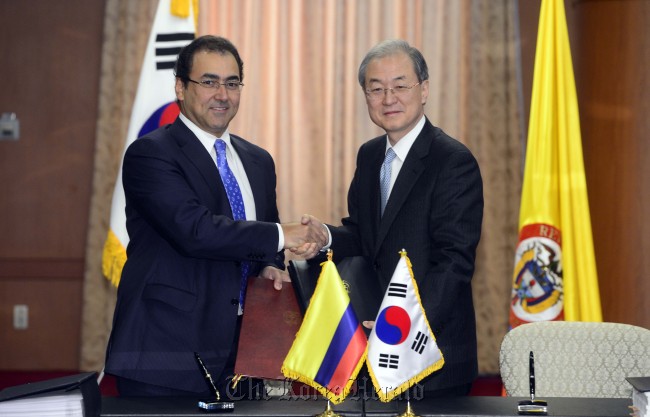Extended network key benefit of Korea-Colombia FTA
Colombian trade minister says benefits will be huge given two countries’ complementary economies
By Korea HeraldPublished : Feb. 21, 2013 - 19:35
Korea’s free trade agreement with Colombia builds on a nexus of FTAs for the Andean nation and will facilitate a trading platform for Korean companies to export to other economies in the region, according to Colombia’s trade minister.
“We have an important internal market with a population of 50 million people, but we also have an important nexus of FTAs with many of the surrounding economies giving Korean companies a platform for exports into those other markets,” said Sergio Diaz-Granados, minister of trade, industry and tourism, in an interview with The Korea Herald on Thursday.
“We have an important internal market with a population of 50 million people, but we also have an important nexus of FTAs with many of the surrounding economies giving Korean companies a platform for exports into those other markets,” said Sergio Diaz-Granados, minister of trade, industry and tourism, in an interview with The Korea Herald on Thursday.

Colombia has FTAs with Brazil, Mexico, the U.S., Canada and, soon, the European Union.
The benefits outweigh the disadvantages and both nations have a lot to gain, Diaz-Granados said in the interview at a Seoul hotel just ahead of a signing ceremony for the trade deal, Korea’s 10th since signing a deal in 2005 with Colombia’s South American neighbor Chile. Korea now has FTAs with three South American nations, including Peru.
“Colombia and Korea have complementary economies. Korea is a net importer of food,” he said. “The FTA could be a good way to promote agribusiness exports from Colombia to Korea.”
Diaz-Granados participated in a signing ceremony with his Korean counterpart, Trade Minister Bark Tae-ho, at the Ministry of Foreign Affairs and Trade on Thursday.
Now the trade deal must be ratified by the legislatures of the two nations and is expected to come into force no later than June.
The agreement will see the phased removal of tariffs on 96 percent of Colombian and Korean goods over 10 years.
The FTA is expected to see a marked increase in such Colombian agricultural products as flowers, bananas and coffee. Colombian exports of coffee to Korea leapt to $97 million in 2011 from just $9 million in 2001. Flowers and bananas from Colombia were virtually nonexistent a few years ago. The FTA could significantly increase the volume of these exports, economists say.
Bilateral trade in 2011 was nearly $2 billion, with about three-quarters of that trade in the usual Korean exports of Kia autos, Samsung cell phones and LG home appliances.
President Lee Myung-bak last year predicted that volume could increase fivefold in five years once the FTA is implemented.
But some politicians in Colombia criticized the deal for that very reason, describing it as veritable “car bomb” to Colombia’s industrial sector.
Senator Jorge Robledo of Alternative Democratic Pole, an opposition party in the Colombian legislature, was quoted by a media outlet there earlier this month as saying that the FTA would devastate Colombian industry, going so far as graphically evoking an instrument of terror, a car bomb.
“Every FTA has friends and enemies,” said Diaz-Granados. “I know this is one of the hard problems to solve.”
Diaz-Granados said Colombia could not hide from competition, however, pointing out that Colombian industrial workers already faced competition from counterparts in Brazil, Mexico and beyond.
“We believe in the next 5-10 years the automobile sector will face more intense competition in a region which will host 60 percent of the global production of automobiles,” he said, adding that the phased-in implementation of the agreement would give industry ample time to adjust accordingly.
“The competition is already here, with the Korean FTA or without the FTA,” he said.
By Philip Iglauer (ephilip2011@heraldcorp.com)
-
Articles by Korea Herald








![[Graphic News] Number of coffee franchises in S. Korea rises 13%](http://res.heraldm.com/phpwas/restmb_idxmake.php?idx=644&simg=/content/image/2024/05/02/20240502050817_0.gif&u=)










